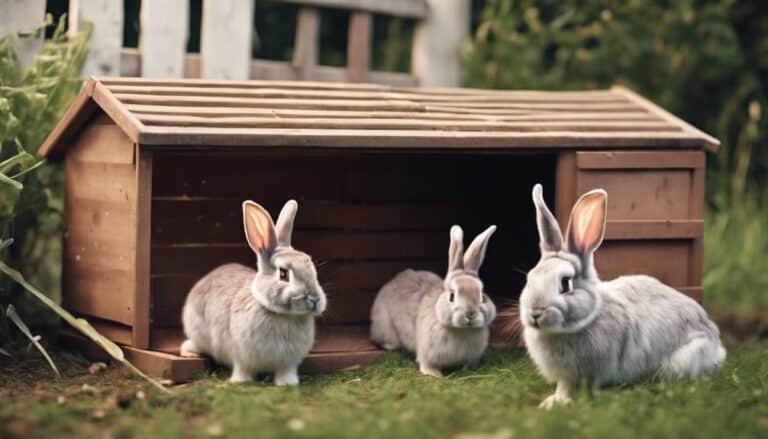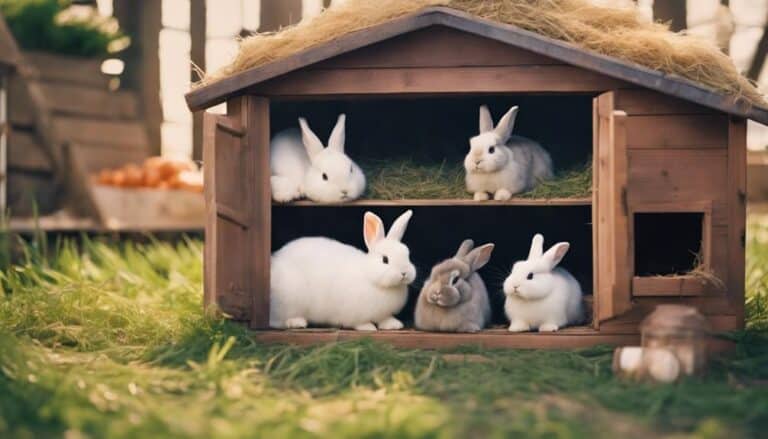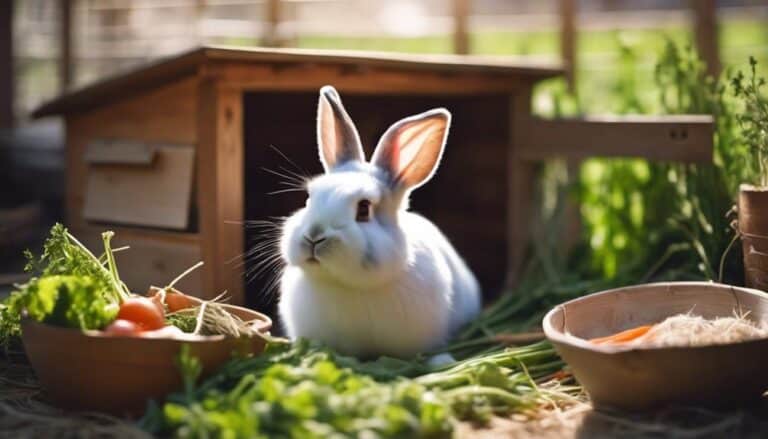When it comes to baby bunnies, their adorable nature can quickly be overshadowed by their mischievous behavior. You may find yourself at a loss on how to handle their antics, but fear not, as there are effective strategies to guarantee a harmonious relationship with your fluffy companions.
By understanding the psychology behind bunny behavior and implementing practical training methods, you can establish a strong bond and foster good behavior in your baby bunnies.
So, what are the secrets to taming these tiny troublemakers?
Contents
Key Takeaways
- Monitor baby bunnies for signs of neglect like coldness or lack of weight gain
- Handle newborn rabbits with care, ensuring a stress-free environment
- Feed baby bunnies a balanced formula and follow specific feeding instructions
- Provide warmth, comfort, and proper nesting to ensure the well-being and survival of baby bunnies
Signs of Neglect
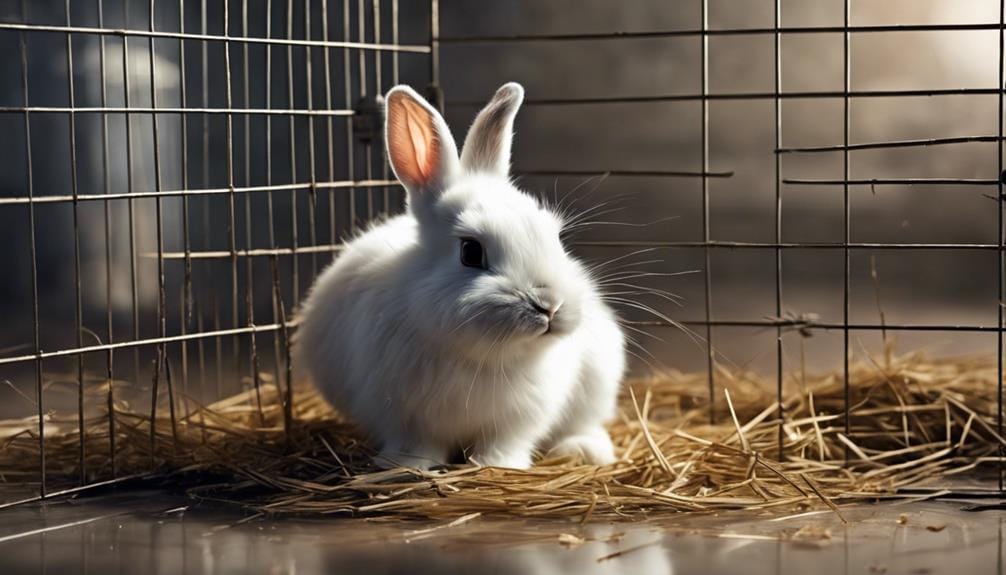
If you notice your baby bunnies with wrinkled skin, shrunken bellies, or appearing cold, it may be a sign of neglect that requires immediate attention. Proper feeding is essential for the well-being of baby bunnies, and these signs indicate that intervention is needed to make sure they receive the care they require.
Neglect can manifest in various ways, such as coldness, bluish skin, or a lack of nursing. Monitoring these signs is important for the overall care of your baby bunnies.
It is important to be vigilant and observant when caring for baby bunnies. Prompt intervention is necessary if you notice signs of neglect like lethargy, dehydration, or a lack of weight gain. Pay close attention to details such as body temperature, skin condition, and feeding behavior to identify any signs of neglect early on.
Handling Newborn Rabbits
When handling newborn rabbits, remember to wash your hands thoroughly to prevent transferring bacteria. Rub your hands in clean hay and on the mother rabbit's fur for scent familiarity before touching the babies. This helps maintain a sense of security for the babies. Make sure that the babies are stress-free during handling to prevent unnecessary distress. Creating a safe and quiet environment for handling is important. Remove any potential hazards from the area to prevent accidents.
Be gentle and cautious when handling newborn rabbits, as they're delicate creatures that require careful attention. Pay close attention to their needs and reactions to make sure they feel safe and secure. Respect the mother rabbit's space and handle the babies with care to maintain a good relationship with the mother. By handling the newborn rabbits with sensitivity and care, you contribute to their overall well-being and development.
Feeding Newborn Rabbits
To guarantee the well-being of newborn rabbits, establishing a proper feeding routine is important for their growth and development. Here are some essential tips for feeding baby rabbits:
- Choose the Right Formula: Opt for a balanced and specialized formula like Wombaroo Rabbit Milk to make sure the baby rabbits receive the necessary nutrition for their growth.
- Proper Feeding Technique: Ensure correct feeding technique by either holding the mother over the babies so they can nurse or gently placing the babies on the nipples for feeding.
- Express Milk if Needed: If the babies are having trouble feeding, express a small amount of milk to entice them to feed properly.
- Consider Hand-Raising: If the baby rabbits aren't effectively feeding from their mother, consider hand-raising them while following specific feeding instructions based on their weight and age for best nutrition.
Providing Warmth
Ensuring the warmth of baby bunnies is essential for their comfort and well-being, especially in their early stages of life. A good nest is vital, mimicking the warmth and security the mother rabbit is known to provide. Line the nest with bunny fur or clean cotton wadding to create a cozy environment for the babies.
If you come across single baby bunnies, using a warm water bottle or a heat pack wrapped in a towel can offer them the extra warmth they need. Be mindful of the temperature to prevent overheating and make sure the babies are content. By maintaining proper warmth, you give the babies a good chance at survival and growth.
Urination and Defecation
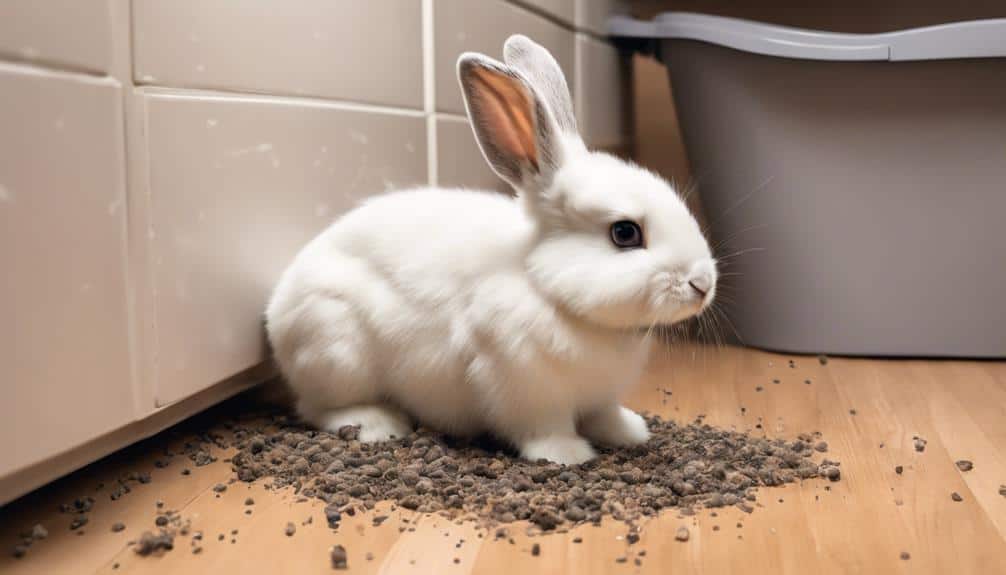
Encouraging young bunnies to develop good bathroom habits involves providing a litter box with appropriate bedding materials in their living area. Here's how you can help your baby bunnies with their urination and defecation:
- Choose the Right Litter Box: Opt for a low-entry litter box to make it easier for baby bunnies to access.
- Use Suitable Bedding: Fill the litter box with hay or shredded paper to attract the bunnies and mimic their natural environment.
- Monitor and Clean Regularly: Keep an eye on the litter box, cleaning it frequently to maintain hygiene and prevent any unwanted odors.
- Reward Good Behavior: Encourage positive bathroom habits by rewarding your baby bunnies with treats or praise when they use the litter box correctly.
Weaning
When weaning baby bunnies, remember to introduce solid foods gradually while reducing their milk intake slowly. This change helps them move smoothly to a new diet without upsetting their delicate digestive systems.
Providing a separate area for them to explore and adjust to solid foods at their own pace can aid in a successful weaning process.
Solid Food Introduction
As baby bunnies reach 3-4 weeks of age, gradually introduce solid foods to begin the weaning process. Here are some tips to help you navigate this stage effectively:
- Offer a Variety: Provide fresh hay, pellets, and leafy greens to encourage independent eating and reduce their reliance on mother's milk.
- Monitor Progress: Keep a close eye on your baby bunnies during the weaning period to make sure they're adapting well to solid foods and getting the nutrition they need.
- Adjust Nursing: Gradually decrease the frequency of nursing sessions as your bunnies become more proficient at eating solid foods.
- Support Growth: Aim to fully wean your baby bunnies off mother's milk by 8 weeks of age to promote their best growth and development.
Gradual Milk Reduction
To successfully wean baby bunnies off milk, gradually reduce their milk intake over a few weeks while introducing hay, pellets, and water alongside nursing sessions. Monitor their progress closely during this weaning period to make sure they're eating enough solid foods and staying hydrated.
As the baby bunnies grow and develop, slowly decrease the number of nursing sessions to encourage their independence with solid foods. Completing the weaning process by 8 weeks of age is important for their proper growth and development.
Frequently Asked Questions
How Do You Make a Baby Bunny Survive?
To help a baby bunny survive, establish a feeding schedule, socialize them gently, use positive training techniques, engage in playtime activities, bond with care, guarantee regular health checkups, and bunny-proof their space. These steps promote their well-being.
What Not to Do With a Baby Bunny?
When caring for a baby bunny, avoid separating them too early, harsh handling, overfeeding, introducing loud noises, or extreme temperatures. Remember, they need their mama, a gentle touch, proper diet, peace, and warmth to thrive.
How Old Do Baby Bunnies Have to Be to Survive on Their Own?
To survive on their own, baby bunnies must be at least 8 weeks old. Before that, they rely on their mother for warmth, milk, and protection. Waiting guarantees they develop necessary skills for independence and safety.
Can Baby Bunnies Survive if Their Nest Is Disturbed?
If a baby bunny's nest is disturbed, they can survive with proper care. Guarantee warmth, quiet, and minimal handling. Monitor closely for well-being. Mother bunny's care is critical. Avoid unnecessary human intervention, support survival instincts, and consider wildlife rehabilitation if needed.
Conclusion
Now that you've learned the ropes of raising baby bunnies, remember that just like these little fluffballs, patience and love go a long way.
Keep nurturing them with care and watch them flourish into happy, hopping bundles of joy.
Remember, the journey of raising baby bunnies is like a delicate dance, so step lightly and enjoy every moment of this precious bond.
Happy bunny parenting!

